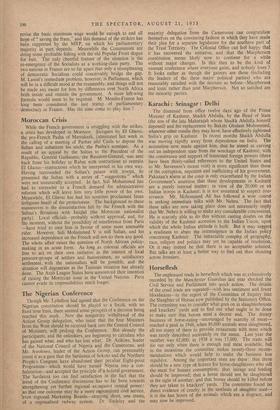Karachi : Srinagar : Delhi
The dismissal from office twelve days ago of the Prime Minister of Kashmir, Shaikh Abdulla, by the Head of State (the son of the late Maharajah whom Shaikh Abdulla himself deposed) and his' replacement by Bakshi Ghulam Mohommed, whatever other results they may have, have effectively tightened India's grip on Kashmir. In recent months Shaikh Abdulla was moving rapidly away from dependence on India. The accusation now made against him, that he aimed at carving out an independent state from the wreckage of Kashmir, with the connivance and support of interested foreign powers (there have been thinly-veiled references to the United States and to Mr. Stevenson's recent visit) is more significant than those of the corruption, nepotism and inefficiency of his government. Pakistan's alarm at the coup is only exacerbated by the Indian Government's assertion that these developments in Kashmit are a purely internal matter: in view of the 20,000 or so Indian troops in Kashmir, it is not unnatural to suspect cony nivance. Mr. Mohommed Ali has followed a wise course in seeking immediate talks with Mr. Nehru. The fact that these talks are now taking place does not necessarily imply that Mr. Nehru is willing to make any considerable concessiond. He is scarcely able to do this without casting doubts on th6 validity of the Kashmir accession to the Indian Union, upon which the whole Indian attitude is built. But it may suggest a readiness to abate the intransigence in the Indian polioY concerning Kashmir. The intractable complex of geography, race, religion and politics may yet be capable of resolution. Or it may indeed be that there is no acceptable solution. But talks are at least a better way to find out than shouting across frontiers.


























 Previous page
Previous page